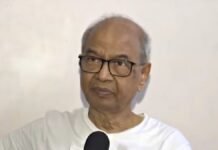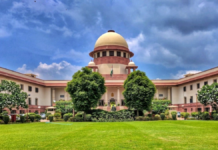
Key Points
- CJI B.R. Gavai warned that judicial activism should never morph into “judicial terrorism” or “judicial audacity,” during a high-stakes hearing on time-limits for constitutional authorities.
- Five-judge Constitution Bench is examining if courts can mandate timelines for Governors/President to act on Assembly-passed bills under Articles 200 and 201.
- Solicitor General Tushar Mehta argued that curbing or time-bounding the Governor’s discretion will upset constitutional balance and undermine elected leadership.
- Bench recalled earlier observations: once a Governor forwards a bill to the President, it cannot be resent; SC had previously indicated decisions by the President should not be kept pending indefinitely.
- President Droupadi Murmu has sought the Court’s opinion under Article 143(1) via 14 questions, including whether judiciary can compel a decision within a fixed timeframe.
New Delhi: The Supreme Court is responding to a Presidential Reference seeking clarity on a recurring constitutional flashpoint: prolonged delays or non-decisions by Governors/President on bills passed by state legislatures. The reference asks whether the judiciary can prescribe a time-bound framework for assent, return, or reservation of bills, and the contours of discretion vested in constitutional offices under Articles 200 (Governor’s powers regarding state bills) and 201 (President’s consideration of reserved bills).
CJI Gavai’s caution on judicial overreach
In a pointed remark that set the tone for the day’s proceedings, CJI B.R. Gavai underlined that while courts must safeguard constitutional processes, “judicial activism” crossing into “judicial terrorism” or “judicial audacity” would be unacceptable. The caution signals the Bench’s sensitivity to separation of powers, even as it weighs mechanisms to prevent governance paralysis arising from indefinite inaction on legislation.
The Bench and the core question
A five-judge Constitution Bench CJI B.R. Gavai with Justices Surya Kant, Vikram Nath, P.S. Narasimha, and A.S. Chandurkar is considering whether the judiciary can:
- Set a firm timeline for Governors/President to decide on bills.
- Define the scope and limits of “withholding assent,” returning bills for reconsideration, or reserving them for Presidential consideration.
- Lay down procedural safeguards to prevent indefinite pendency that effectively vetoes elected legislatures without a reasoned decision.
Centre’s stance: SG Tushar Mehta’s submissions
- Autonomy under Article 200: The Solicitor General argued that a Governor’s power to “withhold assent” is an independent constitutional discretion, not ordinarily amenable to judicially imposed deadlines.
- Democratic accountability: He stressed that undermining the decisions and experience of elected leadership is risky for democracy, as voters directly question their representatives in today’s polity.
- Institutional balance: Imposing rigid timelines could distort the delicate federal and constitutional equilibrium, leading to conflict among branches of the State.
- Role of experience: Citing senior advocate Kapil Sibal’s parliamentary and executive background, the SG suggested the Court benefit from institutional memory on how these processes function in practice.
Prior Supreme Court signals
The Bench recalled earlier judicial guidance that:
- A Governor who reserves a bill for the President does not have an iterative power to keep re-sending; the process must move forward with clarity.
- In a previous order this year, the Court emphasized that decisions on bills—especially after reservation to the President—should not be kept pending for inordinate periods, and had indicated a reasonable outer limit for decision-making to prevent legislative deadlocks.
The President’s 14 questions under Article 143(1)
President Droupadi Murmu’s reference seeks the Supreme Court’s advisory opinion on, among other points:
- Whether the judiciary can mandate a fixed time within which the President and Governors must decide on bills.
- The exact ambit of Articles 200 and 201 what constitutes “withholding assent,” when and how a bill can be returned, and the process and timeline upon reservation for the President.
- What remedies are available to a legislature if a bill remains in limbo, and whether courts can craft enforceable standards without stepping into executive discretion.
Why this matters for Centre State relations
- Legislative certainty: Indefinite delays can stymie governance, budgets, and reforms, especially in states with active legislative agendas.
- Federal balance: A clarified framework would help reduce repeated confrontations between state governments and Raj Bhavans over assent delays.
- Judicial restraint vs. accountability: The decision will shape how far courts can go to prevent constitutional authorities from effectively vetoing elected mandates by inaction, while still respecting separation of powers.
What the Court could consider next
- Reasonable timelines: Whether to articulate indicative or binding timeframes (e.g., 3 months) for assent/return/reservation decisions.
- Duty to give reasons: Mandating a brief, reasoned decision to ensure transparency and enable limited judicial review for mala fides or manifest arbitrariness.
- No iterative loops: Clarifying that once reserved for the President, the process must culminate in a Presidential decision without cyclical returns.
- Structured remedies: Allowing legislatures to seek time-bound directions in exceptional cases of prolonged inaction, without trenching on the merits of assent.
Possible implications of the advisory opinion
- Governors/President: Clearer expectations on timelines and documentation may reduce constitutional stand-offs.
- State legislatures: Greater predictability in the legislative pipeline could help in planning and execution.
- Judiciary: A calibrated framework would aim to prevent drift without substituting judicial will for constitutional discretion.
- Politics: The ruling could recalibrate Centre–State dynamics, particularly in politically polarized environments.















































